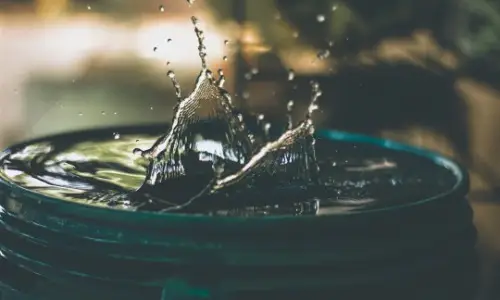Discover 10 Mind-Blowing Water Facts | Quench Your Curiosity
10 Surprising Facts About Water That You Need to Know
We encounter water every day, but how often do we stop to consider just how extraordinary this substance truly is? From the oceans that cover our planet to the cells in our bodies, water is an integral part of life on Earth. But there’s so much more to H2O than meets the eye. Get ready to have your mind blown as we explore 10 surprising facts about water that will make you see this common compound in a whole new light.
1. Water’s Unique Density Quirk
Let’s kick things off with a fact that’s truly cool—literally! Unlike most substances, water is less dense as a solid than as a liquid. This quirky property means that ice floats, which is crucial for life on Earth. Imagine if ice sank—our oceans could freeze solid from the bottom up! This unusual characteristic allows aquatic life to survive in freezing temperatures and plays a vital role in Earth’s climate regulation.
2. The Universal Solvent
Ever wondered why water is so good at cleaning? It’s because water is often called the “universal solvent.”. This doesn’t mean it can dissolve everything (sorry, no disappearing acts here!), but it can dissolve more substances than any other liquid. This property is essential for life, allowing nutrients to be transported within living organisms and throughout our environment.
3. Water’s Cosmic Origins
Here’s a mind-bender for you: some of the water you drink today might be older than the sun! Scientists believe that a significant portion of Earth’s water may have come from comets that bombarded our planet billions of years ago. So, the next time you take a sip, remember—you could be drinking a piece of cosmic history!
4. The Power of Surface Tension
Water’s surface tension is remarkable, allowing some insects to walk on water and plants to transport water from their roots to their leaves. This “stickiness” of water molecules is what creates those perfect little droplets on a rainy day and plays a crucial role in many biological processes.
5. Earth’s Water Distribution
Here’s a sobering fact: while our planet is often called the “Blue Marble,” only about 3% of Earth’s water is fresh, and a mere 0.5% is available for use. The vast majority of Earth’s water—a whopping 97%—is found in our oceans, too salty for drinking or agriculture. This underscores the importance of conserving our limited freshwater resources.
6. The Hidden Life in a Drop
Prepare to be amazed (or maybe a little grossed out): a single drop of ocean water can contain millions of bacteria and viruses, along with an assortment of microscopic plants and animals. It’s a bustling metropolis in there! This incredible biodiversity in such a tiny volume highlights the importance of water as a habitat and a medium for life.
7. Water’s Role in Climate Regulation
Water has a high specific heat capacity, meaning it can absorb a lot of heat before its temperature rises. This property makes our oceans enormous heat sinks, playing a crucial role in regulating Earth’s climate. Without this characteristic, our planet’s temperature would fluctuate wildly, making it much less hospitable for life as we know it.
8. The Thirsty United States
Here’s a fact that might make you think twice about your water usage: Americans use about 100 gallons of water per person per day. That’s significantly more than many other countries. From long showers to lush lawns, our water consumption habits have a substantial impact on our resources.
9. Water’s Journey Through Time
Did you know that the water you drink today could be the same water that dinosaurs drank millions of years ago? The Earth is essentially a closed system when it comes to water; it’s constantly recycled through the water cycle. So, that glass of water you’re sipping might have quite a history!
10. The Power of Conservation
Here’s a fact that shows the power of small actions: if every American flushed the toilet just one less time per day, we could save a lake full of water about one mile long, one mile wide, and four feet deep. It’s a powerful reminder that our individual actions can add up to make a significant difference in water conservation.
Wrapping Up: The Endless Fascination of Water
As we’ve seen, water is far more than just a simple compound of hydrogen and oxygen. From its unique physical properties to its crucial role in sustaining life and regulating our planet’s climate, water continues to amaze and surprise us. These ten facts barely scratch the surface of what makes water such a fascinating and essential substance.Understanding the remarkable nature of water can help us appreciate its value and the importance of conserving this precious resource. As we face global challenges like climate change and water scarcity, this knowledge becomes more crucial than ever.So, the next time you turn on the tap or watch raindrops fall, take a moment to marvel at the incredible substance that is water. It’s not just the stuff of life—it’s a testament to the wonders of our natural world and the delicate balance that sustains us all.
FAQs
- Q: Why does ice float on water?
A: Ice floats because it’s less dense than liquid water, a unique property that’s crucial for life on Earth. - Q: How much of Earth’s water is freshwater?
A: Only about 3% of Earth’s water is fresh, and only 0.5% is readily available for use. - Q: Can water really dissolve more substances than any other liquid?
Yes, water is often called the “universal solvent” due to its ability to dissolve a wide range of substances. - Q: How much water does the average American use per day?
A: The average American uses about 100 gallons of water per day. - Q: Is it true that the water we drink today could be the same water dinosaurs drank?
Yes, Earth’s water is constantly recycled through the water cycle, so the water we drink today has been around for millions of years. - Q: How does water help regulate Earth’s climate?
A: Water has a high specific heat capacity, allowing oceans to absorb and release large amounts of heat, which helps stabilize Earth’s temperature. - Q: Can small changes in water usage really make a difference?
A: Absolutely! For example, if every American flushed the toilet one less time per day, we could save a significant amount of water. - Q: Is it true that some of Earth’s water came from space?
A: Yes, scientists believe that some of Earth’s water may have been delivered by comets billions of years ago.
Sources:
[1] https://www.aquamaster.ca/blog/item/15-amazing-facts-about-water
[2] https://www.thinkh2onow.com/water_conservation_facts.php
[3] https://www.vedantu.com/blog/interesting-facts-about-water
[4] https://www.seametrics.com/blog/water-facts/
[5] https://www.usbr.gov/mp/arwec/water-facts-ww-water-sup.html
[6] https://climatekids.nasa.gov/10-things-water/
[7] https://www.usgs.gov/special-topics/water-science-school/science/facts-about-water
[8] https://www.microbiologics.com/core/media/media.nl?id=179876&c=915960&h=6cec34eb7761f8399351&_xt=.pdf
[9] http://www.vizagsteel.com/kids/kids_cor/Water_Facts.htm
[10] https://www.leominster-ma.gov/DocumentCenter/View/975/Fun-Facts-About-Water-PDF






